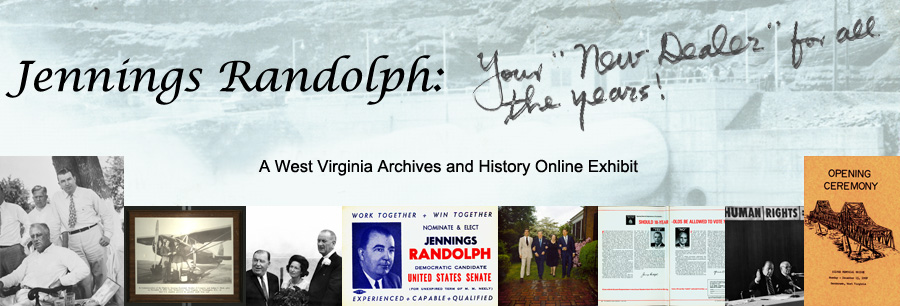
Chapter Four
|
"I essentially am a West Virginia Senator. . . ." - Jennings Randolph |
|
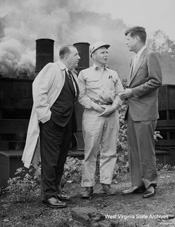
Jennings Randolph, Paul Watson, and John F. Kennedy, McDowell County, West Virginia, May 9, 1959
|
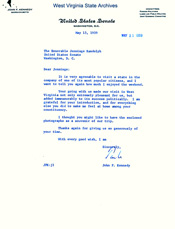
Letter from John F. Kennedy to Jennings Randolph concerning his trip to West Virginia, May 15, 1959
|
Once in the Senate, Jennings Randolph did not hesitate to act. A staunch Democrat, he supported John F. Kennedy in his bid for the presidency in the election of 1960. After Kennedy’s victory, Randolph worked very closely with the new president on matters at both the state and national levels. This trend would continue throughout his career in the Senate. |
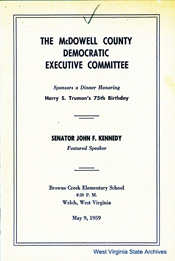
Program, “The McDowell County Democratic Executive Committee Sponsors a Dinner Honoring Harry S. Truman’s 75th Birthday,” May 9, 1959
|
| Randolph served on a variety of committees and subcommittees including the Committee on Environment and Public Works, the Committee on Labor and Public Welfare, the Committee on Post Office & Civil Service, the Committee on Veterans' Affairs, the Special Committee on Aging, the Committee on Appropriations, and the Committee on Interior. From 1965 through 1977, he was the chairman of the Public Works Committee, and he served as chairman of the Committee on Environment and Public Works from 1977 through 1981.1 Randolph’s tenure with this committee earned him the nickname, "Mr. Public Works."
|
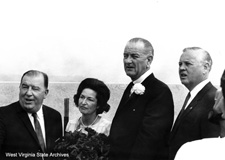
Jennings Randolph with Lyndon B. Johnson, Ladybird Johnson, and Hulett Smith at Summersville Dam Dedication, September 3, 1966
|
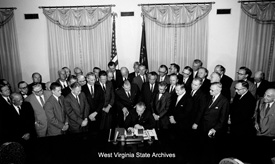
Jennings Randolph with President Lyndon B. Johnson and others, signing of the Federal Aid Highway Act, August 13, 1964
|
From his early days in Congress, Randolph was a strong voice for the development of an interstate highway system. He argued that the development of such a system would aid in national defense, improve the economy, and make traveling much safer. In 1956, the Eisenhower Administration passed the Interstate Highway Act. Though Randolph was not in Congress when the act passed, his early efforts in the House of Representatives have led many to refer to him as the "Father of the Interstate Highway System."2 Randolph saw many victories on this front in the early part of his senatorial career, such as the openings of several sections of I-64, I-77, and I-79. His efforts made West Virginia more accessible and grew the state’s economic opportunities, proving his earlier arguments correct. |
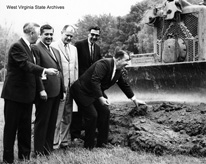
Jennings Randolph with Hulett Smith, Burl Sawyers, John L. Sweeney, and Paul Crabtree, highway project groundbreaking in Doddridge County, first project officially authorized under the Appalachian Regional Development Program, July 6, 1965
|
Throughout the administration of President Lyndon B. Johnson, Senator Randolph played a vital role in the “War on Poverty.” Randolph worked closely with Johnson to help improve the plight faced by the poor of the nation, particularly in Appalachia. The “War on Poverty” brought the passage of many bills to aid the impoverished, such as the Economic Opportunity Act of 1964, the Food Stamp Act of 1964, and the Social Security Act of 1965, which established both Medicare and Medicaid.3 The desire to improve living conditions in Appalachia also led Randolph to sponsor the Appalachian Regional Development Act of 1965, which created the Appalachian Regional Commission (ARC).4
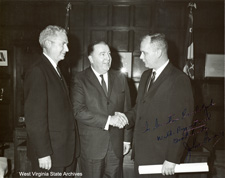
Jennings Randolph with John L. Sweeney, unidentified, swearing-in ceremony, Appalachian Regional Commission, 1965
|
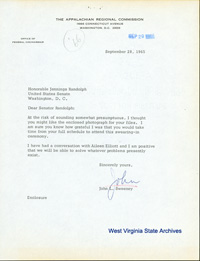
Letter from John L. Sweeney to Jennings Randolph concerning swearing-in photo, September 28, 1965
|
The Appalachian Regional Commission (ARC) has served the people of Appalachia by creating economic opportunities, developing a ready workforce, investing in critical infrastructure, leveraging the region’s natural and cultural assets, and helping to create new leaders to advance the region in the future. 5 Randolph’s strong belief in the goals of the ARC led him to support the commission throughout his political career and to ensure that the commission survived beyond its original expiration date in 1979.
|
A proponent of educational opportunities, Randolph also played a role in the passage of the Manpower Development & Training Act (1962), which helped to retrain displaced workers to use newer technology; the Elementary & Secondary Education Act (1965), which helped to provide funding and equal access to primary and secondary schools; and the Higher Education and Higher Education Facilities Acts of 1963 and 1965, which helped to improve the quality of education at colleges and universities across the nation.6
| The people of West Virginia supported Senator Randolph’s efforts, as evidenced by his re-elections in 1960, 1966, 1972, and 1978.7 By the time the presidency transitioned from Lyndon Johnson to Richard Nixon in 1969, Jennings Randolph had become a powerful and well-respected voice for the people of West Virginia.
|

1960 Election Brochure featuring John F. Kennedy, Lyndon B. Johnson, Jennings Randolph, and W. W. Barron
|
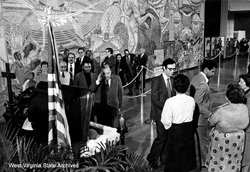
Jennings Randolph saluting casket at Lyndon B. Johnson funeral, 1973
|
Citations
1. Jennings Randolph Profile in "Childhood & Youth" Folder, Florian Collection, WVSA.
2. Nicholas E. Hollis, "Hijacked Legacy: Ethanol and the Highway Trust," The Agri-Business Council, https://www.agribusinesscouncil.org/JR/JR-Highways.htm (accessed May 11, 2018).
3. Dylan Matthews, "Everything You Need to Know About the War on Poverty," The Washington Post, January 8, 2014, https://www.washingtonpost.com/news/wonk/wp/2014/01/08/everything-you-need-to-know-about-the-war-on-poverty/?utm_term=.ec298737d666 (accessed May 11, 2018).
4. "Remembering Senator Jennings Randolph," Appalachian Regional Commission, https://www.arc.gov/magazine/articles.asp?ARTICLE_ID=124&F_ISSUE_ID=16&F_CATEGORY_ID= (accessed May 11, 2018).
5. "About ARC," Appalachian Regional Commission, https://www.arc.gov/about/index.asp (accessed May 11, 2018).
6. "Read What Jennings Randolph has Done for Education and Rehabilitation" Poster, Ms2017-016, Randolph Collection, WVSA.
7. Michael Barone, "Jennings Randolph."
|



